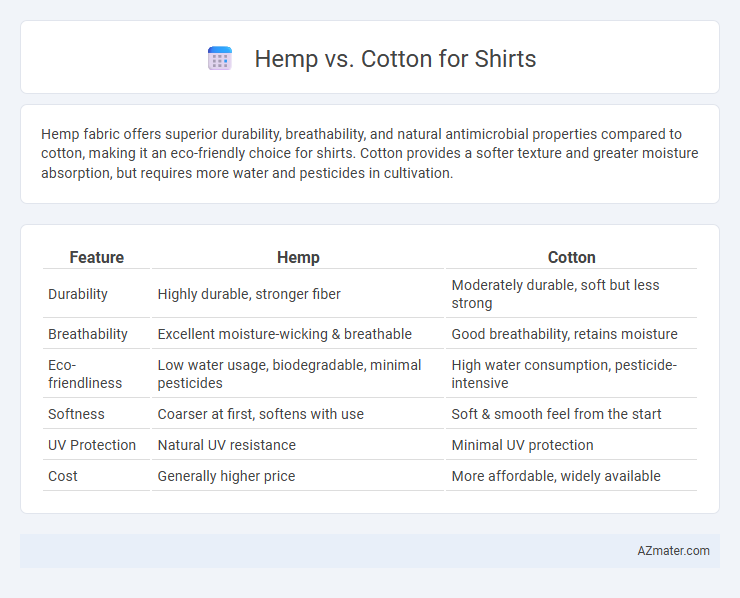Hemp fabric offers superior durability, breathability, and natural antimicrobial properties compared to cotton, making it an eco-friendly choice for shirts. Cotton provides a softer texture and greater moisture absorption, but requires more water and pesticides in cultivation.
Table of Comparison
| Feature | Hemp | Cotton |
|---|---|---|
| Durability | Highly durable, stronger fiber | Moderately durable, soft but less strong |
| Breathability | Excellent moisture-wicking & breathable | Good breathability, retains moisture |
| Eco-friendliness | Low water usage, biodegradable, minimal pesticides | High water consumption, pesticide-intensive |
| Softness | Coarser at first, softens with use | Soft & smooth feel from the start |
| UV Protection | Natural UV resistance | Minimal UV protection |
| Cost | Generally higher price | More affordable, widely available |
Introduction: Understanding Hemp and Cotton Shirts
Hemp shirts are made from fibers derived from the Cannabis sativa plant, offering exceptional durability and natural resistance to mold and UV rays, while cotton shirts come from the soft fibers of the cotton plant, prized for their breathability and comfort. Hemp fabric is known for its eco-friendly cultivation requiring less water and pesticides compared to conventional cotton farming, which often involves significant resource consumption and chemical use. Choosing between hemp and cotton shirts involves balancing sustainability, comfort, and fabric performance based on the intended use and environmental impact.
Environmental Impact: Hemp vs Cotton
Hemp shirts have a significantly lower environmental impact compared to cotton, requiring up to 50% less water and less pesticide use during cultivation. Hemp plants improve soil health by naturally replenishing nutrients and preventing soil erosion, whereas cotton farming depletes soil and relies heavily on chemical fertilizers. The durability of hemp fabric also extends garment lifespan, reducing overall textile waste in the environment.
Water Usage Comparison
Hemp requires significantly less water than cotton, using approximately 300-500 gallons per pound compared to cotton's 700-2,000 gallons per pound. This lower water footprint makes hemp a more sustainable choice for shirt production, especially in regions facing water scarcity. Cultivating hemp also supports soil health and reduces the need for irrigation, further minimizing environmental impact.
Durability and Longevity
Hemp fabric exhibits superior durability compared to cotton, offering a higher tensile strength that resists wear and tear over time. Shirts made from hemp fibers maintain their shape and texture longer, even after multiple washes, due to hemp's natural resilience and resistance to UV light and mold. Cotton, while soft and breathable, tends to weaken and degrade faster with frequent use and exposure to environmental elements.
Comfort and Breathability
Hemp fabric offers superior breathability and moisture-wicking properties compared to cotton, making it an excellent choice for comfortable, cool shirts. Its natural fibers allow better airflow and resist bacterial growth, enhancing freshness throughout the day. Cotton is soft and widely used but tends to retain moisture, which can reduce comfort in hot and humid conditions.
Farming Practices and Sustainability
Hemp requires significantly less water and pesticides compared to cotton, making it a more sustainable choice for shirt production. Its fast growth cycle enables higher yields per acre without intensive soil depletion, promoting eco-friendly farming practices. Cotton farming often relies on heavy chemical inputs and large water consumption, contributing to environmental degradation and resource strain.
Chemical Usage in Production
Hemp requires significantly fewer pesticides and herbicides compared to conventional cotton, making it a more environmentally friendly option for shirt production. Cotton cultivation often involves heavy chemical inputs, including synthetic fertilizers and insecticides, which can result in soil degradation and water pollution. Choosing hemp shirts reduces chemical exposure for farmers and consumers while supporting sustainable agricultural practices.
Cost and Market Availability
Hemp shirts generally cost more than cotton due to higher production expenses and less widespread cultivation, impacting their market availability. Cotton dominates the textile industry with a vast and well-established supply chain, making cotton shirts more affordable and accessible globally. Consumers seeking sustainable options may find hemp shirts less available but worthwhile despite the premium price.
Style Options and Versatility
Hemp shirts offer a unique, textured appearance that lends a natural, earthy style suitable for casual and eco-conscious fashion, while cotton provides a smooth, soft finish with wide-ranging colors and patterns, ideal for both casual and formal wear. The durability of hemp makes it excellent for long-lasting, rugged styles, whereas cotton's breathability and flexibility support diverse design options, including lightweight summer shirts and structured dress shirts. Both fabrics accommodate varied fits and finishes, but cotton's extensive market presence results in more innovative and trendy style choices.
Final Thoughts: Choosing Between Hemp and Cotton Shirts
Hemp shirts offer superior durability, natural antimicrobial properties, and require fewer resources to cultivate compared to cotton, making them an eco-friendly choice. Cotton shirts provide softness and breathability that many consumers prefer for everyday wear. Weighing factors such as environmental impact, fabric texture, and intended use is essential when deciding between hemp and cotton shirts for your wardrobe.

Infographic: Hemp vs Cotton for Shirt
 azmater.com
azmater.com